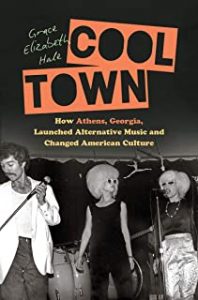 Often described as a sleepy little college town, Athens, Georgia, was wide awake in the 1980s. Roused from its slumber by a percolating DIY music scene that piqued the curiosity of metropolitan tastemakers in New York City, among other places, arty and eccentric Athens was an accepting incubator that nurtured the unique creativity and talent of such trailblazing acts as the B-52’s, Pylon, R.E.M. and Love Tractor, as well as a legion of lesser-known art-pop provocateurs like Oh-OK, the Bar-B-Que Killers, The Squalls and Mystery Date, to name but a few.
Often described as a sleepy little college town, Athens, Georgia, was wide awake in the 1980s. Roused from its slumber by a percolating DIY music scene that piqued the curiosity of metropolitan tastemakers in New York City, among other places, arty and eccentric Athens was an accepting incubator that nurtured the unique creativity and talent of such trailblazing acts as the B-52’s, Pylon, R.E.M. and Love Tractor, as well as a legion of lesser-known art-pop provocateurs like Oh-OK, the Bar-B-Que Killers, The Squalls and Mystery Date, to name but a few.
It must have seemed a blur to Grace Elizabeth Hale, who witnessed the full flowering of an influential “regional rock” hotbed in the most unlikeliest of places. Or, perhaps that’s how Athens was perceived by fascinated outsiders who came to see it as a sort of kudzu-covered nirvana or Garden of Eden, where the rules of art were rarely, if ever, policed and subversive, outlandish experimentation flourished. It was just hard to believe it was happening in the South, as if The Factory of Andy Warhol’s imagination had gone completely off the grid.
Even the more conservative element attending college there at the University of Georgia (UGA) couldn’t squash the movement. Hale was a student and small-business owner in Athens during this heady period of youthful enlightenment, and was in a band, too. With the benefit of hindsight, meticulous research and personal recollections still fresh in her mind, Hale offers an exhaustive examination of a time of silly innocence, Quixotic adventure and bohemian non-conformity with “Cool Town,” an engrossing and substantive read about music and so much more that demystifies Athens’ mythology without souring the romance.
Anything seemed possible as a fun, vibrant big bang of wild parties, queer culture both closeted and out and proud, a pervasive attitude of non-conformity and an art school that encouraged rebellion built a hot house of creative fertility. Hale’s tome makes frequent visits to the sweaty 40 Watt Club, in all its permutations, and other intimate Athens venues, as their origin stories – along with episodes of petty melodrama and competitiveness – are shared with a nostalgic fondness. Now the Commonwealth Professor of American Studies and History at the University of Virginia, Hale provides a wealth of juicy, contextual detail, but packages it in a ping-ponging, nonlinear narrative that flows with surprising ease.
While chronicling the accidental births and thrilling evolutions of Athens’ most important bands, who seemed to spring up out of the dirt with hardly anything resembling a musical education, Hale also untangles and lays bare an ecosystem of underground networks, clubs and late-night hangouts that gave their daring punk amateurism all the oxygen it needed. The folk revival happening in the forgotten rural South gets its due, as Hale escapes the city limits for a broader education long after an in-depth study of the UGA’s progressive – or maybe transgressive is a better word for it – history with regard to art and the professors there who challenged everything.
Colorful characters, like the music scene’s patron saint Jeremy Ayers, with his Warhol connections and vintage fashion sense, and unconventional artist Patrik Keim, are affectionately and honestly remembered for their cultural impact. And there’s plenty about the bands, too, starting with the B-52’s and how their gender-bending playfulness, as well as their offbeat penchant for alien costuming and infectious and inventively skewed rhythms and melodies, captured the imagination of New York City’s avant-garde. The performance art and danceable dissonance of Pylon, as well the group’s loyalty to Athens, are celebrated, with band member Michael Lachowski emerging as a central figure in the community’s story. And then there’s ambitious R.E.M., with its complicated relationship to Athens – and the South in general – and the swamp of mystery Michael Stipe and company knowingly cultivated, while being both adored and hated by its opinionated denizens.
Sex, drugs and rock ‘n’ roll are found in abundance, but it’s different in “Cool Town.” Gone is the glorified machismo of classic-rock legend, replaced by something more fluid in sexual orientation that had less to do with conquest and power dynamics and more to do with simple, unabashed attraction and enjoyment. Still, sexism did rear its ugly head in Athens, and Hale is not sparing in her condemnation of it, while at the same time extolling the tough, confident virtues of the Bar-B-Q Killers’ indomitable Laura Carter and the sublime talents of other female musical insurgents, such as Lynda Stipe and Linda Hopper of Oh-OK and Pylon’s Vanessa Briscoe Hay. There’s a lot to unpack from Athens’ beat-up old suitcase of a town, and Hale takes off the rose-colored glasses while artfully doing so.
—Peter Lindblad





Thanks for this piece!!! Just wanted to ask you to correct one thing. Laura Carter was in the Bar-B-Q Killers, not Mystery Date.